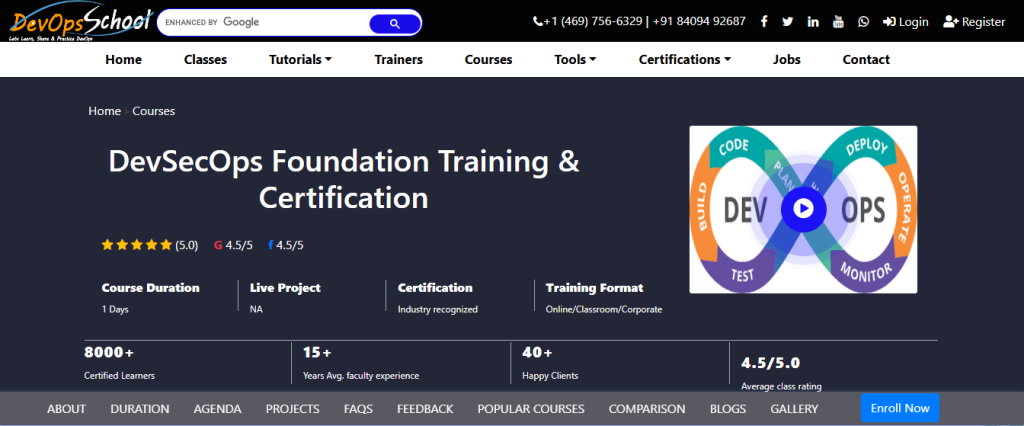
Introduction to DevSecOps Foundation Certification
- Overview: DevSecOps integrates security as a shared responsibility throughout the IT lifecycle, incorporating security practices into DevOps workflows. This certification focuses on securing software from development through to deployment.
- Certification Objective: To empower professionals with foundational knowledge of DevSecOps principles, tools, and security strategies required to maintain robust security in DevOps processes.
- Provider and Trainer Introduction: Highlight DevOpsSchool’s reputation for quality DevOps education and Rajesh Kumar’s expertise in DevSecOps training.
The DevSecOps Foundation Certification by DevOpsSchool equips professionals with a globally recognized credential that showcases their expertise in embedding security at every stage of the DevOps lifecycle. Covering core concepts such as secure SDLC, automated security scanning (SAST/DAST), infrastructure-as-code protection, secrets management, and ongoing compliance, this certification is ideal for developers, security engineers, DevOps practitioners, and IT leaders aiming to validate their skills in building secure and reliable software pipelines. Learn about eligibility criteria, exam format, and how this certification can elevate your career: DevSecOps Foundation Certification.
Complementing the certification, the DevSecOps Foundation Training Course offers a hands-on, interactive learning experience designed to prepare participants for real-world application and certification success. Through expert-led lectures, practical labs, real-world scenarios, quizzes, and mock exams, learners will gain in-depth knowledge of secure coding standards, infrastructure-as-code security, SAST/DAST implementation, continuous compliance automation, and threat modeling. This course ensures you’re ready to not only pass the certification but also implement DevSecOps practices effectively in your organization. Discover the full curriculum and enroll here: DevSecOps Foundation Training Course.
2. Target Audience
- Who Should Attend?: This certification is suitable for IT security professionals, developers, DevOps engineers, and systems administrators who aim to enhance security in CI/CD workflows.
- Prerequisites: Basic understanding of DevOps practices and familiarity with security fundamentals is beneficial but not mandatory.
3. Key Learning Outcomes
- Integrated Security Knowledge: Gain in-depth knowledge on integrating security at every stage of the DevOps lifecycle.
- Practical Skill Development: Develop skills to use DevSecOps tools, automate security testing, and embed security practices into CI/CD pipelines.
- Industry-Readiness: Acquire practical, hands-on experience that aligns with industry standards and best practices.
4. Certification Agenda
| Section | Sub-Section | Description |
|---|---|---|
| Understanding DevSecOps | What is Security? | Definition of security in development. |
| Why Security? | Importance of security in DevOps and risks involved. | |
| What is DevSecOps? | Overview of integrating security in DevOps practices. | |
| Types of Threats in DevOps | Discusses vulnerabilities, misconfigurations, and attacks. | |
| Why DevSecOps? | Benefits of incorporating security within DevOps. | |
| DevOps Security Best Practice Approach | Overview of Best Practices | Preventive, detective, and responsive security measures. |
| Security Concerns by Phase | Security considerations for each DevOps stage. | |
| Security Practice Recommendations | Best practices for CI/CD pipeline security, testing, and access controls. | |
| Recommended Tools | Suggested tools for security testing and monitoring. | |
| DevOps Security Phases | Static Application Security Testing (SAST) | Explains SAST for early code vulnerability identification. |
| Dynamic Application Security Testing (DAST) | Covers DAST for detecting runtime application vulnerabilities. | |
| Runtime Application Security Testing (RAST) | Describes RAST for monitoring application security in real-time. | |
| Database Security Scanning | Focuses on database security for data protection. | |
| Mobile Application Security Testing (MAST) | Discusses testing and securing mobile applications. | |
| DevSecOps Practices | With AWS | Security practices for AWS, including IAM, storage, and monitoring. |
| With Docker | Container security practices like image scanning and isolation. | |
| With Kubernetes | Best practices for securing Kubernetes clusters and resources. | |
| Implementing DevSecOps Tools | OWASP SonarQube for Code Scanning | Demonstration of SonarQube for integrating code scanning. |
| Chef InSpec for App & Infrastructure Scanning | Use of Chef InSpec for configuration and compliance checks. | |
| ELK with Kibana for Log Analysis | Utilizing ELK and Kibana for real-time threat monitoring. | |
| HashiCorp Vault for Secrets Management | Management of sensitive information like API keys and passwords. | |
| Fortify WebInspect (DAST) | Overview of Fortify WebInspect for automated DAST in web apps. | |
| Fortify Application Defender (RAST) | Real-time security with Fortify Application Defender for RAST. |
5. Certification Benefits
- Increased Career Opportunities: With DevSecOps in high demand, certification opens pathways to roles like Security Engineer, DevSecOps Engineer, and Compliance Manager.
- Industry-Recognized Skills: This certification validates your expertise in integrating security into DevOps workflows.
- Hands-On Training: Students gain experience with tools and processes, preparing them for real-world scenarios.
6. Training and Assessment Methodology
- Training Format: The course includes live sessions, labs, and assessments, available both online and offline.
- Evaluation: Includes quizzes, practical assignments, and a final exam to test knowledge.
- Certification Criteria: Successful completion of all modules and a passing score on the final exam are required.
7. Resources and Study Materials
- Core Materials: Comprehensive notes covering each module’s details, as well as documentation for all tools used.
- Supplementary Resources: Access to DevSecOps forums, online security repositories, and recommended reading for extended learning.
8. Certification Exam Details
- Exam Format: Multiple-choice questions, practical case studies, and tool-based exercises.
- Passing Criteria: Students must achieve a specific score for certification.
- Validity: This certification is valid indefinitely, though students are encouraged to stay updated on industry advancements.
9. How to Enroll
- Registration Process: Visit DevOpsSchool.com and follow the registration steps for DevSecOps Foundation Certification.
- Payment Methods and Refund Policy: Information on available payment options and refund eligibility.
10. About the Trainer
- Rajesh Kumar: An experienced DevSecOps practitioner and trainer, Rajesh Kumar brings extensive expertise in DevSecOps and security automation.
- Trainer’s Website: Additional resources and articles available at www.RajeshKumar.xyz.